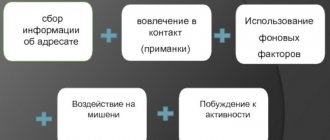What determines a person’s life outcome and success? Of course, these are the skills and abilities that he possesses. At the same time, it is extremely important to understand that they can and should be mastered and developed at any age, because the more we are able to do, the more different goals we can achieve. Today we want to talk about how skills and abilities are formed and what stages this process consists of, as well as give several recommendations for their development that everyone can use.
A little about skills and abilities
Scientific minds around the world are still engaged in serious debate about what constitutes the top of the hierarchy in the system of developing new knowledge, skills and abilities in a person that characterize his intellectual development. Some researchers say that skills are more important, while others say that skills are more important. Let's look at the differences.
A skill can be called the highest level of formation of any action - when it is performed automatically and a person does not need to be aware of the intermediate stages. A skill is the ability to act, which is performed consciously and has not yet reached the highest level of formation.
For example, when a person learns to perform some action with a specific goal, he first does it as consciously as possible, focusing on each intermediate step, and each step is stored in consciousness. The process of mastering the action is realized and developed. This means that skill is formed first.
Further, when a person systematically trains and continues to work on himself, his skill improves. The time to perform an action is reduced, and some of the intermediate stages begin to be performed unconsciously, automatically. And here we can already say that a full-fledged skill in performing an action is being formed.
Based on the above, we can conclude that a skill is an improved form of skill. If, for example, a child learns to read, it is initially difficult for him to “make” words from individual letters, and mastering this skill takes a lot of effort and time. But an adult, in the process of reading, reads letters and words automatically, controlling only the semantic aspect.
This means that thanks to long and persistent exercises and training, the ability to read has turned into a skill. The development of speech skills in preschoolers, the development of creative and social skills, the formation of business writing skills, etc. occur in exactly the same way.
A skill is an activity formed through repeated repetition and bringing it to automatism. An indicator that a person has a skill is that before performing an action, he does not think in advance about how exactly he will perform it, but when performing it, he acts accurately and quickly.
The formation and development of skills and abilities is a fairly long process that takes a lot of time. This often takes several years if we are talking about a complex action. As for improving skills and abilities, this generally occurs throughout a person’s entire life. This is what psychology says about skills and abilities.
Join the group
There are many benefits to working in a group setting. You will be able to learn something new from those around you and increase your motivation. Whether you meet in real life or online, being in a group of people with a common interest changes the learning experience.
Don't Start with a Pay Range: The Art of Negotiating a Salary Increase
Don't Compromise: How a Boss Can Deal with Very Difficult Employees
The salary is higher, but your wallet is still empty: how to avoid falling into the “lifestyle trap”
Stages of skill development
The process of developing a skill involves going through four main stages:
- Stage one . It can be safely described as preliminary. Here a so-called skill program is formed, individual elements are divided into components, and indicative and test actions are carried out. This stage is also distinguished by a large amount of information about actions. And as test actions are performed, from this information the consciousness selects only that which helps to perform them correctly.
- Stage two . It is analytical. The elements of the main action are still performed separately. The brain analyzes the strength, duration, magnitude and other parameters of the execution of the elements. In addition, individual actions are formed (for example, between controls and instruments). After this, it becomes possible to carry out actions in alternation. There is a very narrow scope of perception here, and if during the training process (mastering a skill) some external stimuli are present, the person’s attention simply does not perceive them.
- Stage three . The best characteristic for it is synthetic. Independent elements of a holistic action are formed into a single formation and constitute one sensory field. The execution of an action at this stage is regulated in a generalized manner, consisting of the sequence, relationship and hierarchy of its individual elements.
- Stage four . This is the automation stage, because here all unnecessary elements of the action are eliminated (when performing a physical action, excess muscle tension is eliminated). A person’s attention shifts from the process of performing an action to the result. All this is due to the fact that control of action moves from vision to kinesthesia and touch. It is at this stage that a person gains the opportunity to control the pace of actions performed; an individual rhythm is formed.
Here’s how you can display the process of formation (and presence) of a skill schematically:
If for some reason a person takes a break from an activity related to a mastered skill, the skill may become deautomated, i.e. "forget yourself." But this is not as scary as it might seem, because after a short time of additional training he recovers quite quickly.
We must not forget that the main and most important condition for the formation of any skill is repeated repetition of the action, and it does not matter what it concerns: the ability to drive a car, do a “pinwheel” with your feet, read quickly or solve complex problems. Through repeated repetitions, actions move to a new level, lose conscious direction, become automated and turn into skills.
This is the basic information you need to know about skill development in order to grasp the very essence of the mechanism of this process. Next, we want to move on to specific recommendations, but we advise you to additionally read our articles “How to quickly develop new skills”, “Development of intelligence” and “Development of thinking”, in which you will also find a lot of useful information on this topic.
Use the Pareto principle
Find those twenty percent of the work that can provide you with eighty percent of the results. For example, when learning a new language, you will quickly realize that only a few words are repeated over and over again. Look for a list of the most common and used ones and learn it, then expand your stock further.
Carrying out someone else's task: situations when you can safely say “no” at work
How much money will Russians have to pay for caviar for the New Year: expert opinion
We rely on a shortened model: how to choose a bridesmaid dress for a woman over 50
Development of skills and abilities: basic recommendations
You can successfully follow the recommendations presented below yourself, or use them to develop skills in children, preschoolers, schoolchildren, etc. Here are just a few areas they are great for:
- development of educational skills;
- development of creative skills;
- development of social skills;
- development of speech skills;
- development of skills in basic and business writing, etc.
In total, we offer ten recommendations:
- Mastering skills and abilities, teaching them and improving them should be a continuous process. It includes gaining new experience, getting acquainted with the ideas and methods of professionals, complicating the problems being solved, and applying the experience gained in life.
- The process of mastering new skills must be subordinated to a specific system. You can master something haphazardly, but it is much more effective to find or develop your own program of classes and training. It is best if there is space for daily practice.
- Development needs to be approached comprehensively. This means that different formats for teaching and improving skills should be used. The materials can be anything: books, videos, audio, interactive exercises on the Internet, tests, etc. The main thing is to get as much practice as possible.
- It is important to develop curiosity about the information around you. You need to study everything related to your area of interest and the application of the skills you are mastering: achievements and developments, innovations and new trends, business processes, etc. Curiosity and broad-mindedness greatly enhance the effect of mastering skills and abilities.
- Development must not only be subordinated to the system, but also planned. Any skill should be developed gradually, without pursuing the goal of becoming a professional overnight. At the same time, it is important to identify the highest priority areas of development, achievements in which will help you become more successful and achieve new results in life, study and work.
- Be sure to form new habits. In particular, get used to daily reading literature and visiting websites related to your areas of interest, as well as areas of success and personal effectiveness. Read about other useful habits in our article “Good Habits for Life.”
- Strive to develop and improve personal and professional skills not only in your free time, but also during working hours. Don't be afraid to take on responsibility, solve difficult problems and work on unusual and creative projects. Getting out of your comfort zone is great for personal development.
- Skill development depends on your social circle. To better learn something, to become a professional in any field, communicate with people who already have experience in what interests you. They will be able to tell and show you how and what to do correctly, and will help you avoid many mistakes.
- One of the indicators of successful or unsuccessful mastery of a particular skill should be considered feedback from people around you. Watch how people evaluate what you do, analyze it and draw appropriate conclusions to become better.
- Don't neglect the opportunities for additional education where you live. Look for and attend trainings, seminars and master classes in areas of interest. But first, of course, read reviews and ask for the opinions of people who attended similar events.
At the initial stage, these recommendations will be quite enough so that the development of skills and the formation of a skill that interests you occurs faster and gives better results. But still, we want to give a few more tips on what self-development tools you need to adopt:
- One of the best, most useful and effective ways to develop skills (and development in general) is self-education. Reading books, articles, scientific papers, blogs, manuals, etc. promotes the acquisition of new knowledge and the development of successful models of action and behavior.
- We've already mentioned feedback, but let's repeat that by receiving it from friends, colleagues, mentors, managers and experts, you can learn a huge amount of information about how you do what you do, in which you have already become proficient, and what else needs to be worked on.
- Mentoring. Essentially, it is learning from other people's experiences. You need to find a person (or several) who has achieved success in a field that is relevant to you and has all the competencies you are interested in and make him your mentor or mentor - a person from whom you will follow an example.
- Completing special tasks that you can give yourself is an equally effective way to develop skills and abilities. It especially concerns the development of creative skills, the development of educational skills and the development of social skills. Gradually raise your bar - the result will not take long to arrive.
- Continuous improvement of skills and abilities. What this means is that you need to constantly work on yourself – always and everywhere: at home, while walking, at work, in the gym, etc. If you wish, you can find many ways to improve your abilities in various conditions and life circumstances.
Choose any of these options and you will be guaranteed success. It's even better if you start using them all, although this is not so important. It is much more important to constantly and systematically train - only in this case will knowledge of how to do something turn into skill, and skill will become a skill.
Well, for those who have decided not to stop there at any cost, we offer several options on how to develop any skill even faster. These tips, as before, are suitable for developing social, creative, academic and other skills. This is also true for children and schoolchildren.
Get enough sleep
Try exercising right before you go to bed. It is believed that actions performed four hours before bedtime are remembered best. Your memory and fine motor skills will develop at an accelerated pace.
Analyze your anxiety: how to make decisions under stress
How to give gifts to everyone and save a lot of money at the same time
Don’t refuse help: what else you can’t do if your employer fires you
Development of skills and abilities in a short time
Today you can find many different ways, methods and techniques for developing skills and abilities in any area of life. Many books and articles have been written on this topic, and there are various manuals, including specialized ones. However, any option will be based on four rules that must be strictly followed.
Rule one: one period of time - one skill
In order for the development of a skill to be effective, and for it to become firmly rooted in consciousness and life, to become automated, it is important to pay as much attention to it as possible, and there are good reasons for this.
Childhood is a period in which a person can grasp an incredible amount of information and knowledge on the fly. Look at children: at the same time they learn to handle objects, talk, walk, fasten buttons and tie shoelaces. But even though a child’s mind is open to everything new, it takes him months to master some basic skills from an adult’s point of view.
With age, such abilities to absorb new knowledge and simultaneously master different skills are no longer so acute. Often, even one complex skill has a stressful effect on our body and psyche.
In addition to this, if we master several skills at the same time, our subconscious will try to connect them together, causing them to appear complex. And this, in turn, can cause the most unexpected results. For example, if for some reason one of the two skills you are learning is not given to you or you simply no longer need it, the second skill “associated” with it may “disappear” along with it.
If you are committed to developing a skill of any kind, if it is important to you, devote time only to it. It must be mastered by you in a concentrated form. If this is so, you will be able to master it quickly and efficiently, and after that you can begin to master the next skill, and then by analogy.
Rule two: the first training sessions are for quantity, not quality.
Please note that most of the time, a person learning a new skill will not be very good at it, no matter how hard they try. If you rely on the quality of the actions performed from the very beginning, you will slow down your development.
At the initial stage, it is much more effective to work on quantity. It will be better if you do 50 repetitions with an average result than 10 repetitions with a good result. Only after fully mastering the technique can you begin to hone it.
Even scientific research confirms the fact that with systematic and regular intensive training, errors and shortcomings are eliminated by themselves. You don't even have to do anything to get better, just keep working.
Accept it as truth: a person learns tens of times faster by simply repeating the same actions than if he tried to perfect them over and over again from the first attempts. As for making tasks more difficult for yourself, be sure to read our article “State of Flow.”
Rule three: practice a new skill repeatedly
Let's say you went to some wonderful training or master class, where there was practice. Everything worked out great for you, and even at home that same evening you demonstrated impressive results to your family. But then a few days pass, you were busy with work and other things, and when you decide to do what you learned again, you either do it very poorly or don’t do it at all.
You can make this observation yourself and be convinced of its veracity. And this happens for the reason that at the seminar your body and psyche were in a stressful situation, internal reserves were activated. Plus enthusiasm and a little euphoria - and everything went like clockwork. In ordinary life, everything happens differently.
In order for a new skill to begin to form into a skill, for it to develop and its application to bear fruit, it needs to be given constant attention. Think of knowledge as a seed that you need to cultivate. A sprout is a skill, and a flower is your skill. If you don’t take care of the grain and don’t water it, nothing will grow.
It’s the same with skills: make sure they don’t go to waste and wither before they even have time to bloom. Constant work, maximum practice and consistency - this is what is needed for new skills to be consolidated and gain strength, to become more perfect. Add patience to this - and you will definitely succeed.
Rule four: do not use a new skill in important matters
Naturally, this only applies to the stage of mastering a new skill. Imagine that you just went to boxing training for the first time. You liked everything and it worked out well. And so you immediately decide to enter the ring against a professional boxer. What do you think will happen? You will be knocked out in the first minute of the fight.
While you are just learning a new skill, practice, but do not rush to test your strength in “battle”. There are many factors at play here: inexperience, importance of the event, stress from performing unusual actions, etc. All this will most likely lead to dire consequences.
Therefore, at first – only training and development. Gradually begin to introduce a new skill into life, trying to use it in simple situations that are close to everyday ones. And when you gain a little experience, use it for more serious situations, systematically moving forward in the most difficult ones.
We are sure that now your store of knowledge has been well replenished, and the development of skills and abilities will become at least a little easier and faster. We wish you success!
Did you like the article? Join our communities on social networks or our Telegram channel and don’t miss the release of new useful materials: TelegramVKontakteFacebook
We also recommend reading:
- Storytelling
- Best of the year. Part five
- Social skills: what they are, what they are and how to develop them
- Halperin's theory of mental action
- Skill Matrix
- 7 Habits of Highly Effective People by Stephen Covey
- How to quickly learn any skill
- General educational skills and abilities: description and main ways of development
- Genetic psychology
- How to quickly instill a skill in yourself
- Hard skills
Keywords:1LLL
Celebrate your success
Every little thing, every new step can be a reason for joy. Your brain will release serotonin and endorphins if you raise your arms in the air and clench your fists in triumph. Or maybe you'd prefer to reward yourself with chocolate. Either way, have a way to celebrate a significant step towards success. Enjoy the process. If learning excites you, you will be more willing to devote time to it every day. Imagine the joy of what you did, be an improved version of yourself. If you love yourself, there is nothing better than constant self-development and the pursuit of new and new skills in order to make your life happier and more meaningful.
Found a violation? Report content
Why the 10,000 hour rule doesn't always work
There's really no rule
The 10,000-hour thesis was formulated by Canadian journalist Malcolm Gladwell in his book “Geniuses and Outsiders”: this is supposedly exactly how much it takes to become an expert in any field. But this statement is not entirely correct. Gladwell relied on research by KA Ericsson, RT Krampe, C. Tesch-Römer. The role of deliberate practice in the acquisition of expert performance / Psychological Review 1993. They calculated that the most talented and promising musicians devote an average of 10,000 hours to playing the violin by the age of 20.
But later, when Gladwell’s rule had already been replicated, the authors of the original study repeatedly stated Malcolm Gladwell got us wrong: Our research was key to the 10,000‑hour rule, but here’s what got oversimplified / Salon.com that the journalist misinterprets his results. No one really knows how long it takes to become an expert. It depends on the field of activity, the abilities of the person himself, and the intensity of the activity.
It demotivates us.
A person is afraid that he simply does not have enough time and energy, and never dares to do what interests him.
You don't have to be an expert
For pleasure and even to earn money, sometimes it is enough to master just a few skills or techniques well. For example, in order to earn income from handicrafts, you can learn how to knit cool hats and scarves (it doesn’t take that long), and get to more complex things like dresses, sweaters and cardigans when the mood and desire strikes you.
Currently reading










